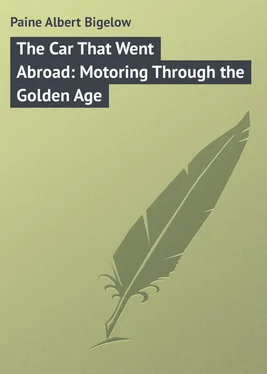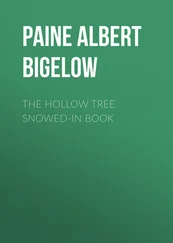Albert Paine - The Car That Went Abroad - Motoring Through the Golden Age
Здесь есть возможность читать онлайн «Albert Paine - The Car That Went Abroad - Motoring Through the Golden Age» — ознакомительный отрывок электронной книги совершенно бесплатно, а после прочтения отрывка купить полную версию. В некоторых случаях можно слушать аудио, скачать через торрент в формате fb2 и присутствует краткое содержание. Жанр: foreign_prose, Путешествия и география, на английском языке. Описание произведения, (предисловие) а так же отзывы посетителей доступны на портале библиотеки ЛибКат.
- Название:The Car That Went Abroad: Motoring Through the Golden Age
- Автор:
- Жанр:
- Год:неизвестен
- ISBN:нет данных
- Рейтинг книги:5 / 5. Голосов: 1
-
Избранное:Добавить в избранное
- Отзывы:
-
Ваша оценка:
- 100
- 1
- 2
- 3
- 4
- 5
The Car That Went Abroad: Motoring Through the Golden Age: краткое содержание, описание и аннотация
Предлагаем к чтению аннотацию, описание, краткое содержание или предисловие (зависит от того, что написал сам автор книги «The Car That Went Abroad: Motoring Through the Golden Age»). Если вы не нашли необходимую информацию о книге — напишите в комментариях, мы постараемся отыскать её.
The Car That Went Abroad: Motoring Through the Golden Age — читать онлайн ознакомительный отрывок
Ниже представлен текст книги, разбитый по страницам. Система сохранения места последней прочитанной страницы, позволяет с удобством читать онлайн бесплатно книгу «The Car That Went Abroad: Motoring Through the Golden Age», без необходимости каждый раз заново искать на чём Вы остановились. Поставьте закладку, и сможете в любой момент перейти на страницу, на которой закончили чтение.
Интервал:
Закладка:
It was dusk when we reached the outskirts of Arles and stopped to light the lamps. The wide street led us into the business region, and we hoped it might carry us to the hotels. But this was too much to expect in an old French, Provençal, Roman city. Pausing, we pronounced the word "hotel," and were directed toward narrower and darker ways. We had entered one of these when a man stepped out of the shadow and took charge of us. I concluded that we were arrested then, and probably would not need a hotel. But he also said "hotel," and, stepping on the running-board, pointed, while I steered, under his direction. I have no idea as to the way we went, but we came out into a semi-lighted square directly in front of a most friendly-looking hostelry. Then I went in and aired some of my phonograph French, inquiring about rooms on the different étages and the cost of dîners and déjeuners , and the landlady spoke so slowly and distinctly that it made one vain of his understanding.
So we unloaded, and our guide, who seemed to be an attaché of the place, directed me to the garage. I gathered from some of the sounds he made that the main garage was complet – that is to say, full – and we were going to an annex. It was an interesting excursion, but I should have preferred to make it on foot and by daylight. We crossed the square and entered a cobbled street – no, a passage – between ancient walls, lost in the blackness above, and so close together below that I hesitated. It was a place for armored men on horseback, not for automobiles. We crept slowly through and then we came to an uphill corner that I was sure no car without a hinge in the middle could turn. But my guard – guide, I mean, signified that it could be done, and inch by inch we crawled through. The annex – it was really a stable of the Middle Ages – was at the end of the tunnel, and when we came away and left the car there I was persuaded that I should never see it again.
Back at the hotel, however, it was cheerful enough. It seemed an ancient place of stone stairways and thick walls. Here and there in niches were Roman vases and fragments found during the excavations. Somewhere underneath us were said to be catacombs. Attractive things, all of them, but the dinner we had – hot, fine and French, with vin compris two colors – was even more attractive to travelers who had been drinking in oxygen under the wide sky all those steady miles across the Crau.
Chapter IV
MISTRAL
(From my notes, September 10, 1913)
Adjoining our hotel – almost a part of it, in fact, is a remnant of the ancient Roman forum of Arles. Some columns, a piece of the heavy wall, sections of lintel, pediment, and cornice still stand. It is a portion of the Corinthian entrance to what was the superb assembly place of Roman Arles. The square is called Place du Forum, and sometimes now Place Mistral – the latter name because a bronze statue of the "Homer of the Provence" has been erected there, just across from the forum entrance.
Frédéric Mistral, still alive at eighty-three, is the light of the modern Provence. 4 4 Written in 1913. Mistral died March 24th of the following year.
We had begun to realize something of this when we saw his photographs and various editions of his poems in the windows of Marseilles and Aix, and handbills announcing the celebration at St. Remy of the fiftieth anniversary of Gounod's score of Mistral's great poem, "Mireille." But we did not at all realize the fullness of the Provençal reverence for "the Master," as they call him, until we reached Arles. To the Provence Mistral is a god – an Apollo – the "central sun from which other Provençal singers are as diverging rays." Whatever Mistral touches is glorified. Provençal women talk with a new grace because Mistral has sung of them. Green slopes and mossy ruins are viewed through the light of Mistral's song. A Mistral anniversary is celebrated like a Declaration of Independence or a Louisiana Purchase. They have even named a wind after him. Or perhaps he was named after the wind. Whichever way it was, the wind has taken second place and the people smile tenderly now, remembering the Master, when its name is mentioned.
I believe Mistral does not sing in these later days. He does not need to. The songs he sang in youth go on singing for him, and are always young. Outside of France they are not widely known; their bloom and fragrance shrink under translation. George Meredith, writing to Janet Ross in 1861, said: "Mistral I have read. He is really a fine poet." But to Meredith the euphonies of France were not strange.
And Mistral has loved the Provence. Not only has he sung of it, but he has given his labor and substance to preserve its memories. When the Academy voted him an award of three thousand francs he devoted it to the needs of his fellow poets; 5 5 Daudet in his Lettres de Mon Moulin says:
when he was awarded the Nobel prize he forgot that he might spend it on himself, and bought and restored an old palace, and converted it into a museum for Arles. Then he devoted his time and energies to collecting Provençal relics, and to-day, with its treasures and associations, the place has become a shrine. Everything relating to the life and traditions of the Provence is there – Roman sculpture, sarcophagi, ceramics, frescoes, furnishings, implements – the place is crowded with precious things. Lately a room of honor has been devoted to the poet himself. In it are cases filled with his personal treasures; the walls are hung with illustrations used in his books. On the mantel is a fine bust of the poet, and in a handsome reliquary one finds a lock of hair, a little dress, and the cradle of the infant Mistral. In the cradle lies the manuscript of Mistral's first and greatest work, the "Mireille." The Provence has produced other noted men – among them Alphonse Daudet, who was born just over at Nîmes, and celebrated the town of Tarascon with his Tartarin. But Daudet went to Paris, which is, perhaps, a sin. The Provence is proud of Daudet, and he, too, has a statue, at Nîmes; but the Provence worships Mistral.
Chapter V
THE ROME OF FRANCE
There is no record of a time when there was not a city at Arles. The Rhone divides to form its delta there – loses its swiftness and becomes a smooth highway to the sea.
"As at Arles, where the Rhone stagnates," wrote Dante, who probably visited the place on a journey he made to Paris. There the flat barrenness of the Crau becomes fertile slopes and watered fields. It is a place for men to congregate and it was already important when Julius Cæsar established a Roman colony and built a fleet there, after which it became still more important – finally, with its one hundred thousand inhabitants, rivaling even Marseilles. It was during those earlier years – along through the first and second centuries – that most of the great building was done, remnants of which survive to this day. Prosperity continued even into the fourth century, when the Christian Emperor Constantine established a noble palace there and contemplated making it the capital of his kingdom.
But then the decline set in. In the next century or two clouds of so-called barbarians swept down from the north and east, conquering, plundering, and establishing new kingdoms. Gauls, Goths, Saracens, and Francs each had their turn at it.
Following came the parlous years of the middle period. For a brief time it was an independent republic; then a monarchy. By the end of the fifteenth century it was ready to be annexed to France. Always a battle ground, raided and sacked so often that the count is lost, the wonder is that any of its ancient glories survive at all. But the Romans built well; their massive construction has withstood the wild ravage of succeeding wars, the sun and storm of millennial years.
Читать дальшеИнтервал:
Закладка:
Похожие книги на «The Car That Went Abroad: Motoring Through the Golden Age»
Представляем Вашему вниманию похожие книги на «The Car That Went Abroad: Motoring Through the Golden Age» списком для выбора. Мы отобрали схожую по названию и смыслу литературу в надежде предоставить читателям больше вариантов отыскать новые, интересные, ещё непрочитанные произведения.
Обсуждение, отзывы о книге «The Car That Went Abroad: Motoring Through the Golden Age» и просто собственные мнения читателей. Оставьте ваши комментарии, напишите, что Вы думаете о произведении, его смысле или главных героях. Укажите что конкретно понравилось, а что нет, и почему Вы так считаете.












